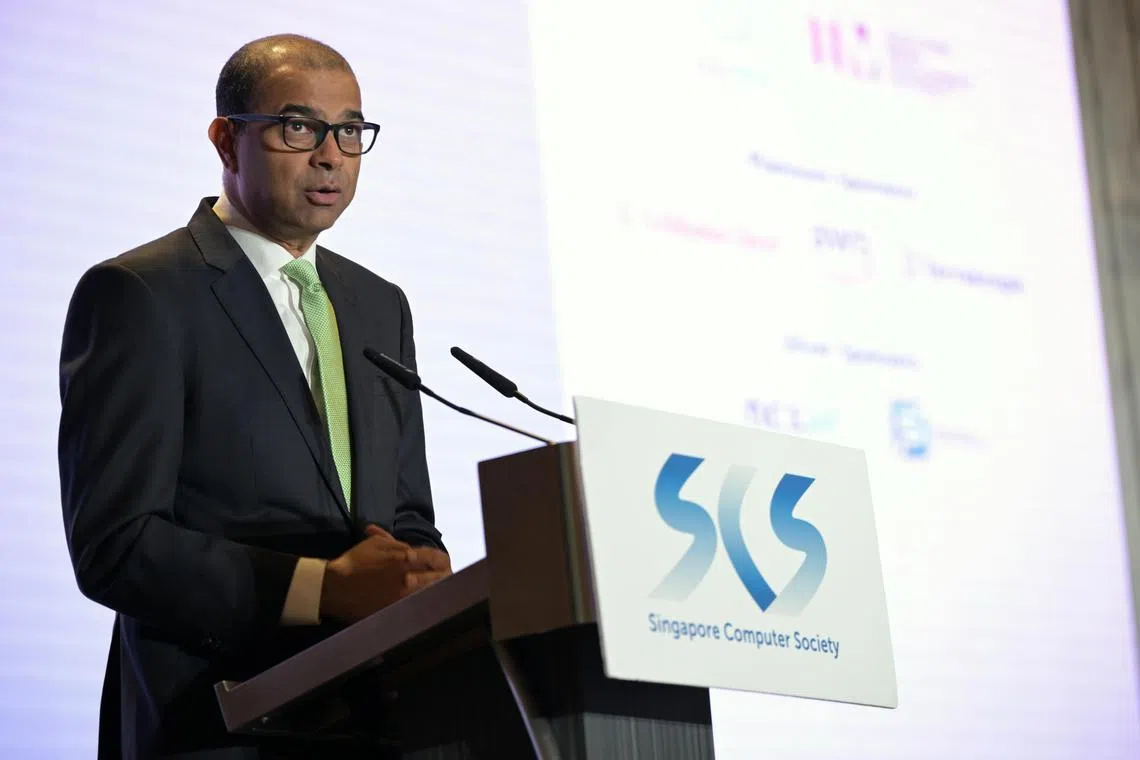Fears of tech sector’s environmental impact prompts $30m research into carbon-aware software
Sign up now: Get ST's newsletters delivered to your inbox

Senior Minister of State for Communications and Information Janil Puthucheary announced the plans at the Singapore Computer Society's Sustainable Tech Forum 2024.
ST PHOTO: NG SOR LUAN
SINGAPORE - The convenience of ChatGPT, streaming videos and digital banking comes at a hefty price: surging carbon emissions from data centres, a growing concern for the tech sector’s environmental impact.
To study how the coding behind artificial intelligence (AI), blockchain technology and other software tools can be more environmentally friendly, the authorities have set up a $30 million research initiative, which will rope in academic institutions and tech firms to set common standards and find new solutions.
The research is in response to rising emissions that are expected from the information and communications technology (ICT) sector, which will account for up to 30 per cent of greenhouse gas emissions by 2050,
Dr Janil announced these plans on the morning of Jan 24 at the Singapore Computer Society’s Sustainable Tech Forum 2024 at Orchard Hotel.
He said: “Digital technology itself generates emissions; it is important to make sure that digital technology is adopted in an energy-efficient way... This is why IMDA (Infocomm Media Development Authority) is rolling out two programmes targeted at lowering the carbon emissions of software applications.”
Under the Green Computing Funding Initiative, $30 million will be set aside to drive research into how software can be coded to prioritise energy efficiency.
The initiative will bring together researchers from institutes of higher learning and from the industry to build low-carbon digital solutions.
Major tech companies like Amazon Web Services, NCS and Alipay owners Ant Group are also participants of green software trials that aim to put theory to the test to assess how effective green software truly is.
AI is among the most pressing areas of concern as its computation uses large amounts of energy, said Dr Ong Chen Hui, assistant chief executive of Biztech at the Infocomm Media Development Authority. “One commonly cited statistic is training a GPT-3 language model is equivalent to the lifetime carbon emissions of eight cars,” she told the media.
The initiative aims to find ways to improve the sector’s energy efficiency, as well as to set common standards for the industry, instead of relying on subjective benchmarks set by companies, Dr Ong said.
“If we can have a more objective metric that can be applied to different kinds of software, that will really help us to drive the conversation (forward) as an objective criteria of what is green.”
Mr Henry Chang, deputy chief executive at GovTech Singapore, said in a keynote speech that the tech sector can improve how it manages computing resources, such as building systems that are “always available instead of always on” to be more resource-efficient and by implementing data lifecycle policies instead of hoarding outdated data.
“All of these consume energy,” he said.
Ms Carrie Suen, the firm’s senior adviser of global affairs and sustainability strategies, said companies like Ant Group use AI to time when to increase computing capacity, like when large volumes of customer traffic are detected during a sale.
The new initiative expands the scope of IMDA’s plans to green the ICT sector and comes after guidelines issued in June 2023 to make data centres here more energy efficient despite operating in a warm tropical climate.
Dr Janil said: “We recognise that merely improving hardware efficiency is not sufficient to move carbon emissions to a more sustainable level... The software also needs to be addressed.”


